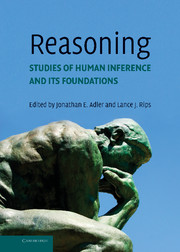42 - Use or Misuse of the Selection Task? Rejoinder to Fiddick, Cosmides, and Tooby
Published online by Cambridge University Press: 05 June 2012
Summary
Introduction
Why has Wason's selection task (Wason, 1966) been, for almost 40 years, so extensively used in psychology of reasoning? Because it has a simple, logically compelling solution, and yet, in most versions, most participants fail to solve it. Philosophers have seen this as highly relevant evidence in assessing human rationality (e.g., Stein, 1996). Psychologists have found ways of improving participants' performance, in particular by changing the narrative content of the task, and have offered various interpretations of these results. Selection task data have thus been garnered in support of various general claims about human reasoning.
In particular, Leda Cosmides, John Tooby, and their collaborators have, over the past 20 years, performed a variety of original selection task experiments to establish the existence of evolved domain-specific reasoning mechanisms. Their most famous, best developed hypothesis concerns the existence of a “social contract algorithm,” one subcomponent of which is a cheater detection device (Cosmides, 1989; Cosmides & Tooby, 1989, 1992, 1997; Fiddick, Cosmides, & Tooby, 2000). They define a social contract as a situation in which one party is obligated to satisfy a requirement in order to be entitled to receive a benefit from another party, and they define cheating as the taking of the benefit without satisfying the requirement. A social contract situation can be depicted in a selection task by means of cards representing on one side whether or not the benefit has been taken and on the other side whether or not the requirement has been satisfied.
Information
- Type
- Chapter
- Information
- ReasoningStudies of Human Inference and its Foundations, pp. 866 - 874Publisher: Cambridge University PressPrint publication year: 2008
